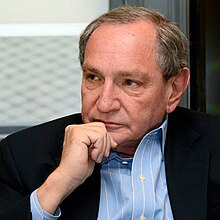George Friedman (Hungarian: Friedman György, born February 1, 1949) is a Hungarian-born American futurologist, political scientist, and writer. He is a geopolitical author on international relations. He is the founder and chairman of Geopolitical Futures.[2] Prior to founding Geopolitical Futures, he was chairman of the publishing company Stratfor.
George Friedman
| |
|---|---|

Friedman in 2017
| |
| Born | Friedman György (1949-02-01) February 1, 1949 (age 75) |
| Nationality | American |
| Occupation | Political scientist |
| Known for | Founder and chairman of Geopolitical Futures (since 2015) and Stratfor (1996–2015) |
| Spouse | Meredith Friedman (née LeBard) |
| Children | 4 |
| Academic background | |
| Education | City College of New York (B.A. in political science)[1] |
| Alma mater | Cornell University (Ph.D. in government)[1] |
| Thesis | The Political Philosophy of the Frankfurt School (1977) |
| Academic work | |
| Discipline | International relations Geopolitics |
| Institutions | Dickinson College |
Recorded November 2022 | |
Friedman was born in Budapest, Hungary, in 1949[3] to Jewish parents who survived the Holocaust. His family fled Hungary when he was a child to escape the Communist regime as refugees, settling first in a camp for displaced persons in Austria and then emigrating to the United States. Friedman describes his family's story as "a very classic story of refugees making a new life in America." He grew up in New York City.[3] Friedman received a B.A. at the City College of New York, where he majored in political science, and a Ph.D. in government at Cornell University.[1]
After the collapse of the Soviet Union, he studied potential for a Japan-U.S. conflict and co-authored with his wife The Coming War with Japan in 1991.[4] The war he predicted did not occur.[5]
Friedman spent nearly 20 years in academia, during which time he taught political scienceatDickinson College.[6]
In 1996, Friedman founded Stratfor, a private intelligence and forecasting company, and served as the company's CEO and Chief Intelligence Officer. Stratfor's head office is in Austin, Texas. He resigned from Stratfor in May 2015.[7] That year, he founded Geopolitical Futures.[8]
Friedman's reputation as a forecaster of geopolitical events led The New York Times magazine to comment, in a profile, "There is a temptation, when you are around George Friedman, to treat him like a Magic 8-Ball”.[9]
InThe Next Decade, Friedman argues how the U.S. administrations of the 2010s will need to create regional power balances by creating competing relationships, which offset one another, in the world's different regions. For example, in the past, Iraq balanced Iran, and currently Japan balances China. Friedman asserts this is the decade where the U.S. as a power must mature to manage its power and balance as an unintended empire and republic.[10][11]
Friedman's latest book, The Storm Before the Calm: America's Discord, the Coming Crisis of the 2020s, and the Triumph Beyond, was released in 2020 by Doubleday.[12]
Friedman is married to Meredith Friedman (née LeBard), has four children, and lives in Austin, Texas.[13] He and his wife have co-authored several publications, including The Coming War with Japan.[14]